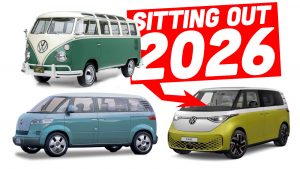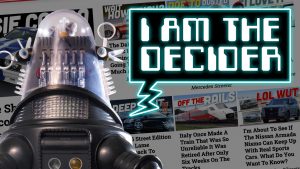The United States Senate just voted to strike down California’s ability to set its own environmental standards, an ability Congress gave the state over half a century ago when the skies over many of its cities were clogged with acrid smog. In the 60 years since, America’s cars have become way more efficient and pollute a lot less. This is a good thing for everyone, and California’s waiver had a lot to do with it.
Besides a general dislike of any policy from California, the move was a reaction to the state’s aggressive stance towards electrification. While the United States has no EV mandate, California (and the 11 states that follow its guidance) do. Because of the size of these states and the importance of those markets, California’s specific requirement that all new cars and light trucks be zero-emission vehicles by 2035 functioned as a quasi-EV requirement for most automakers.
Automaker groups and aftermarket organizations, like SEMA, have applauded the move:
“SEMA thanks the lawmakers from both sides of the aisle who stood up for Americans’ freedom to determine which vehicles are best for them,” said SEMA President and CEO Mike Spagnola. “We thank those in the nation’s community of automotive enthusiasts and the aftermarket businesses who engaged in the advocacy process, many for the first time, to remind lawmakers that this is the United States of America, not the United States of California. Congress’ vote gives the nation’s automotive marketplace much-needed stability, which will deliver renewed investment and sufficient resources to aid our industry in doing what we do best: innovating the future of automotive technology.
On the other side of the aisle, climate groups are complaining. Here’s Natural Resources Defense Council President Manish Bapna:
“This vote is an unprecedented and reckless attack on states’ legal authority to address the pollution causing asthma, lung disease, and heart conditions. After a multimillion-dollar lobbying campaign from Big Oil, Republicans readily jettisoned their long-held view that states can best enact measures that reflect the values and interests of their residents.
Halting these standards makes no sense: They reduce costs for drivers, boost domestic manufacturing, improve air quality, and help address the climate crisis.
If other states don’t like California’s approach, they don’t need to follow it—but federal lawmakers shouldn’t be intervening to block states from providing cleaner air and a healthier environment.”
Currently, only around one quarter of new car sales in California go to EVs, and that number seems to have stalled out. The goal was to hit 35% EV (including some plug-in sales) by 2026. That almost certainly wasn’t going to happen, ban or no ban. While it’s possible that advances in battery technology, changes in market tastes, or more affordable products will result in mass electrification by 2035, I think the more realistic outcome is a mix of hybrids, PHEVs, EREVs, and more electric cars with a small handful of straight-ICE vehicles (mostly trucks).
The election of a Republican Congress and President that largely doesn’t seem to believe climate change is real, and a desire to undo most of the initiatives of the previous administration, means that the otherwise lofty goal was even more unrealistic than when it was last proposed.
China has shown that if you get all levers of society working towards the goal of electrification, it’s possible to quickly transform your national fleet. President Biden, with the Inflation Reduction Act, and similar laws, was attempting to do just that. There were huge incentives for companies to electrify, including a $7,500 tax credit for most new electric cars. There was money for new battery plants and money given to states to put up new electric chargers.
That was the carrot. California was the stick. One can’t really exist without the other.
While not final, the text of this morning’s big tax/budget bill from The White House guts almost every way that Democrats tried to reduce energy consumption and pollution, according to Politico:
House Republicans escalated their effort to gut Democrats’ clean energy tax credits, releasing updated text Wednesday night of their mega-reconciliation bill that would eviscerate former President Joe Biden’s trademark climate law despite resistance from moderates within their own party.
The revised bill expected to receive a floor vote — likely Thursday — contains language pushed by hard-line conservatives speeding up the phaseout of tax credits after they protested the Ways and Means Committee’s draft that was already set to severely restrict the subsidies. The amended language was released after President Donald Trump went to Capitol Hill to warn lawmakers in his party not to vote against the bill.
And here’s Wyoming Senator John Barrasso on the move:
“They were losers going out the door and they said ‘we’re coming after you — the American people — with our leftist dreams,’ ” Barrasso said. “This is a whole new meaning in California of fantasy land…America can’t meet these impossible standards, not next year, not in 10 years, and the American people don’t want to meet those standards.”
I agree that few Americans want to be told they have to drive an electric car, but a majority of Americans are at least open to the idea of owning one. Polling also shows that about two-thirds of Americans consider global warming/climate change a real concern.
Carmakers are going to continue to build more efficient cars because federal-level regulations still exist (even if the Trump Administration is trying to roll them back at the EPA). It’s also what people want. Few motorists desire to pay more for gasoline or have cars that are worse for the environment. While carmakers may be slower to make changes, they’re not going to suddenly swap hybrids for V8s.
The two biggest issues with electrification are cost and the fact that the world relies too much on China for the technology and materials necessary to make batteries. What the combination of the Inflation Reduction Act and California waiver did was pressure various industries to make the changes required to correct those issues, while also providing a lot of incentive to do so.
If there had been a Democratic President and/or Congress and none of these changes had happened, then I think it’s very likely that you’d have seen the money continue to pour in for new projects while the requirements were getting pushed back a little, as this was already happening during the Biden Administration.
While California’s specific goals were probably loftier than reality, in their absence, I’m worried the car industry is going to be slower to change. While the impetus to make cleaner cars will be there, the lack of money from the Feds and requirements from California is likely going to combine to set American automakers back even more on developing electric cars and EREVs, which are the future.
When President Kennedy said America would put a man on the Moon by the end of the decade, no one at NASA was sure how to do it. I don’t know how to get to 100% electrification by 2035, and I’ve always been skeptical that we’d get there. At the same time, reducing pollution and preventing climate change is likely an existential requirement (I have a kid with asthma, so it is to me at least).
Trying something hard; in this case, was better than not trying at all.









Very sad news but of course, not the least bit surprising.
Pretty much nothing surprises me any more when it comes to our current President and his administration. No degree of malfeasance, short-sightedness, blatant corruption, self-serving greed, or naked hypocrisy is ever too much for him, and thus, for us.
I honestly don’t think that systemic impacts being made now will or could be recovered from within my remaining lifetime 🙁
This article failed to point out that the federal government doesn’t have the legal authority to end CARB’s abilities. Electrek explains it well:
https://electrek.co/2025/05/22/republicans-in-congress-illegally-vote-to-end-clean-air-rules-they-cant-actually-end/
Sadly, legality has not stopped this administration from doing what they want to this point
If a majority of people are open the owning an electric car then we don’t need to government to force the issue. We didn’t need the government to force us to abandon horses for cars.
We kinda did to make personal cars such a thing. The mass investment in the US interstate, one of the largest public works projects in human history, is part of the reason people don’t just use busses and trains.
The investment in the interstate system happened in the 1950’s. We had fully switched from horses by then.
Horses weren’t expediting a climate crisis. It’s ideal for the majority of people to want an EV, but that doesn’t mean government shouldn’t be doing all it can to speed up those people’s adoption of EVs.
Horses were a massive health problem in cities. An ICE cat is much better for the environment than each individual having a horse.
That said, evs would be better than an ice car. A phev would do much of the heavy lifting without needing extensive infrastructure changes, but it would take increasing gas prices and lowering electricity rates to really incentivize charging which is politically difficult especially for low income voter bases.
Horses caused local pollution — they weren’t contributing to something catastrophic on a global level, especially given human population numbers at the turn of the 20th century.
True, but if you scale horses to current car usage, it would be an issue.
My point is that i wish the government pushed more towards cheaper electricity talong with cheaper electric cars and heat pumps.
I wish the government did that also.
Our current office holder (I hesitate to call him President, because he is anything but presidential) believes windmills are killing us, giving us cancer ad nauseum. So, there goes cheaper electricity.
I can’t get my condo HOA to let us replace our 20-year-old, low-efficiency gas heaters with heat pumps because the outside units would be “unsightly.” These condos also don’t have a/c, which is getting increasingly more desirable as summers here (PNW) are getting warmer over time.
I don’t get what the desired end game/result this administration wants. I have not seen a clear articulation of that. What does their “Great America” look like when they’re done?